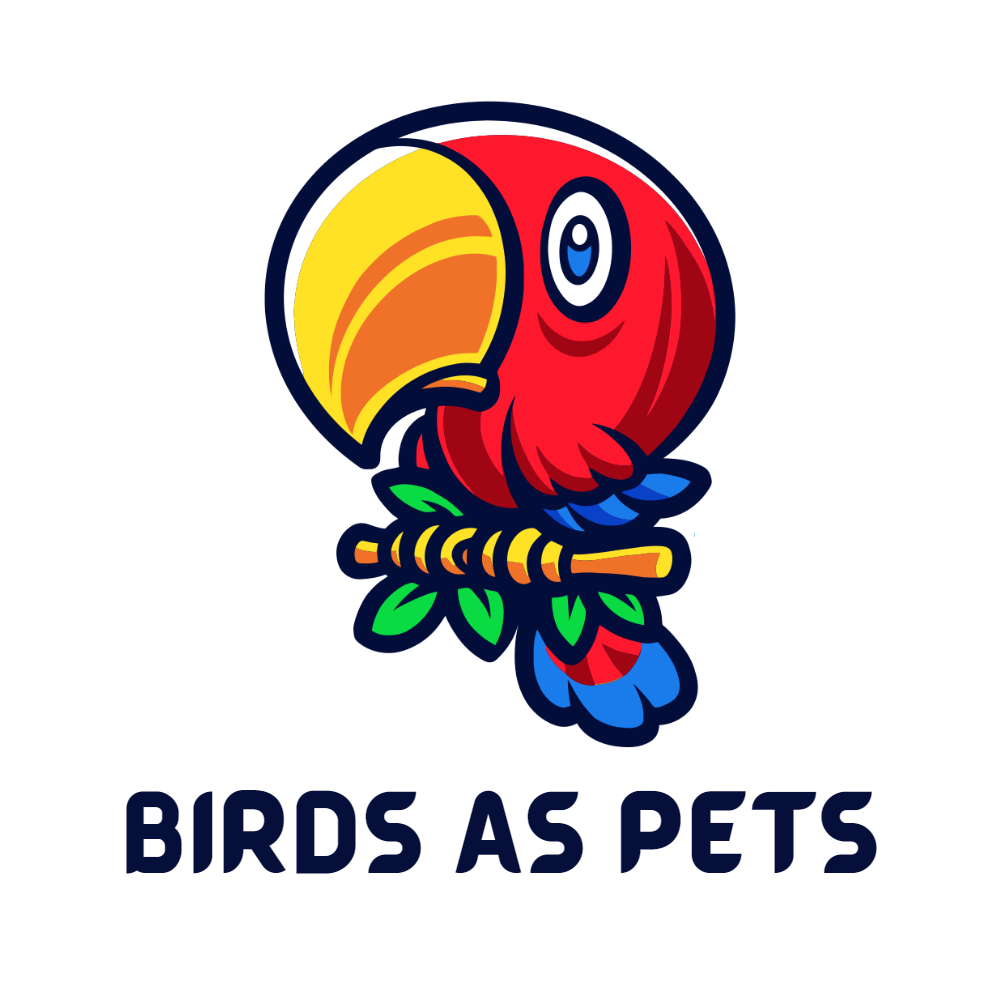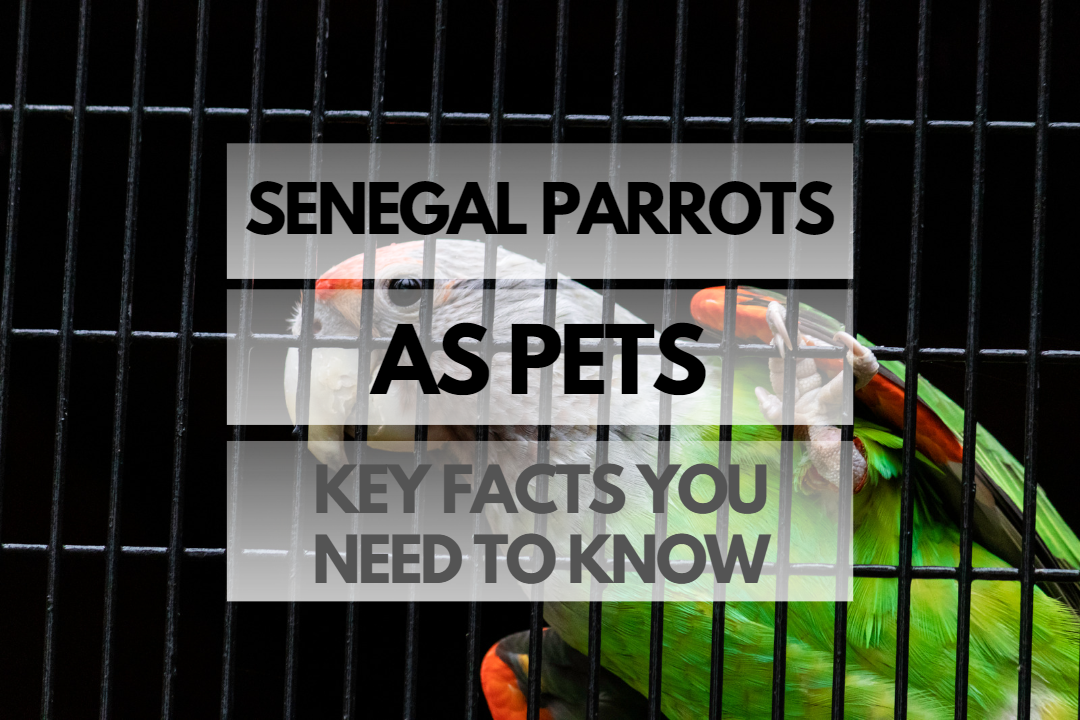If you’re considering a Senegal Parrot as a pet, you’re in for a treat! These charming and intelligent birds make excellent companions for the right person. In this article, we’ll cover everything you need to know about Senegal Parrots as pets, from their natural habitat to their care requirements and more. Let’s dive in!
Quick Reference Table: Senegal Parrot Facts
| Fact | Details |
|---|---|
| Size | 9-10 inches (23-25 cm) |
| Weight | 110-170 grams |
| Lifespan | 20-30 years |
| Colors | Green, yellow, and gray with orange/red belly patch |
| Talking ability | Moderate |
| Temperament | Affectionate, social, and intelligent |
Where Do Wild Senegal Parrots Live?
Wild Senegal Parrots are native to the woodlands and savannahs of West Africa, particularly in countries such as Senegal, Guinea-Bissau, and Mali. They can be found in a variety of habitats, including dry forests, mangroves, and savannah woodlands.
Senegal Parrots Lifespan: How Long Do They Live as Pets?
With proper care, Senegal Parrots can live between 20-30 years as pets. Factors that contribute to their lifespan include diet, exercise, and overall living conditions. Time commitment is essential, as these birds require regular social interaction and mental stimulation to thrive.
Are Senegal Parrots Good Pets?
Yes, Senegal Parrots can make excellent pets for the right person. They are known for their affectionate and social nature, as well as their intelligence and playful demeanor. Senegal Parrots can also be quite entertaining and are known to be good talkers, making them a popular choice for pet bird enthusiasts.
Are Senegal Parrots as Pets Good for Beginners?
Senegal Parrots can be a good choice for beginners, as they are generally hardy and adaptable birds. However, it’s essential to remember that they still require a significant amount of time and attention to ensure their well-being. Proper research and preparation are crucial before bringing a Senegal Parrot into your home.
Are Senegal Parrots Easy to Care For?
While Senegal Parrots are relatively low maintenance compared to some larger parrot species, they still require consistent care and attention. This includes providing a balanced diet, a clean and spacious living environment, and plenty of mental and social stimulation.
Senegal Parrots Pros and Cons
| Pros | Cons |
|---|---|
| Affectionate and social | Can be noisy |
| Intelligent and playful | Require regular interaction |
| Good talkers | Can be territorial |
| Relatively low maintenance | Not suitable for those with limited time |
Senegal Parrots Price and Costs
Senegal Parrots typically cost between $400 and $800, depending on factors such as age, sex, and source. Initial setup costs, including a cage, perches, toys, and feeding supplies, can range from $200 to $500. Ongoing expenses include food, veterinary care, and additional toys or cage accessories.
Where to Buy Senegal Parrots
It’s essential to purchase your Senegal Parrot from a reputable breeder or rescue organization. This helps ensure that you bring home a healthy, well-socialized bird. Always ask for health records and take the time to observe the bird’s behavior and living conditions beforemaking a decision.
Caring for Senegal Parrots
Proper care for your Senegal Parrot will ensure they live a happy, healthy life. This involves providing a balanced diet, a clean and safe living environment, and regular mental and social stimulation.
Senegal Parrots Food
A balanced diet for your Senegal Parrot should consist of high-quality pellets, fresh fruits, vegetables, and occasional seeds and nuts. Avoid feeding your parrot high-fat or high-sugar foods, as well as anything toxic, such as avocado, chocolate, or caffeine.
Health and Common Issues
Senegal Parrots are relatively hardy birds, but they can still suffer from common health issues such as feather plucking, respiratory infections, and beak or foot problems. Regular veterinary check-ups and maintaining a clean living space can help prevent many of these issues.
Signs of Healthy Senegal Parrots
| Healthy Senegal Parrot | Sick Senegal Parrot |
|---|---|
| Bright, clear eyes | Cloudy or swollen eyes |
| Smooth, well-groomed feathers | Ruffled, plucked, or dirty feathers |
| Active and alert | Lethargic or unresponsive |
| Regular eating and drinking | Loss of appetite or excessive thirst |
| Normal droppings | Unusual droppings (color, consistency, or frequency) |
Senegal Parrots Pet Insurance
Investing in pet insurance for your Senegal Parrot can help cover unexpected veterinary costs, ensuring you can always provide the best care for your feathered friend. Many companies offer policies tailored specifically for birds, covering accidents, illnesses, and routine care. Be sure to compare different policies and providers to find the right coverage for your needs.
Personality and Behavior
Senegal Parrots are known for their affectionate, social, and intelligent nature. They are curious and playful, often delighting their owners with their antics. However, they can also be territorial and may develop a strong bond with one person, potentially leading to jealousy towards other household members. Proper socialization and consistent interaction can help minimize these issues.
Are Senegal Parrots Social?
Yes, Senegal Parrots are highly social creatures that thrive on interaction with their owners and other birds. They require regular mental and social stimulation to stay happy and healthy. Failing to provide enough social time can lead to boredom, depression, and behavioral issues such as feather plucking.
Speech and Noise of Senegal Parrots
Senegal Parrots are known for their moderate talking ability. They can learn to mimic a variety of sounds, including human speech, and develop a small vocabulary. However, they are not as prolific talkers as some other parrot species. Senegal Parrots can be noisy, especially when they want attention, but their vocalizations are generally less loud than larger parrots.
Similar Species to Senegal Parrots
There are several parrot species similar to Senegal Parrots in size, appearance, and temperament, including:
- Meyer’s Parrot
- Red-bellied Parrot
- Jardine’s Parrot
- Indian Ringneck Parakeet
Before choosing a parrot species, it’s crucial to research their specific care requirements and ensure they align with your lifestyle and expectations.
Can Senegal Parrots Live With Other Pets and Birds?
Senegal Parrots can coexist with other birds and pets when properly socialized and supervised. However, it’s essential to monitor their interactions, as some Senegal Parrots can become territorial or aggressive towards other animals. Providing ample space and separate living quarters for each pet can help minimize potential conflicts.
Are Senegal Parrots Legal to Have as Pets?
In most countries, including the United States, it is legal to own Senegal Parrots as pets. However, local regulations may vary, so it’s essential to check with your local authorities to ensure compliance with any laws or restrictions in your area.
Additional Resources
For more information about Senegal Parrots, consider exploring the following resources:
- Books: “Parrots for Dummies” by Nikki Moustaki, “The Senegal Parrot Handbook” by Mattie Sue Athan
- Forums: Avian Avenue, Parrot Forums
- Facebook Groups: Senegal Parrot Lovers, Senegal Parrot Owners
- Scientific Articles: “Senegal Parrot Vocalizations and Their Relation to Human Speech” by Stéphanie Watine and Karl-Heinz Frommolt
FAQ for Senegal Parrots as Pets
Do Senegal Parrots talk?
Yes, Senegal Parrots can learn to talk and mimic sounds, though their vocabulary is generally smaller than that of other parrot species.
Are Senegal Parrots suitable for families with young kids?
Senegal Parrots can be suitable for families with young kids if properly socialized and supervised. However, they may become territorial or jealous around their favorite person, so it’s essential to teach children how to interact with the bird appropriately.
Can Senegal Parrots be trained?
Yes, Senegal Parrots are intelligent and can be trained to perform various tricks, commands, and behaviors. Positive reinforcement and patience are key to successful training.
How do I know what gender Senegal Parrots are?
It can be difficult to determine the gender of a Senegal Parrot by appearance alone. DNA testing or surgical sexing by a qualified avian veterinarian are the most accurate methods for determining the sex of your parrot.
What size cage is suitable for a Senegal Parrot?
SenegalParrots need a spacious cage to accommodate their size and activity levels. A minimum cage size of 24 inches wide, 24 inches deep, and 36 inches tall is recommended. However, larger cages are always better, as they provide more space for your parrot to move around, stretch their wings, and engage in enrichment activities.

